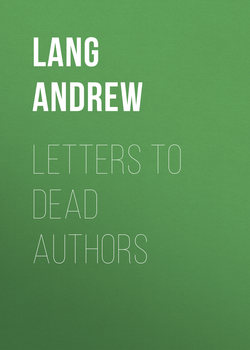Letters to Dead Authors

Реклама. ООО «ЛитРес», ИНН: 7719571260.
Оглавление
Lang Andrew. Letters to Dead Authors
PREFACE
I. To W. M. Thackeray
II. To Charles Dickens
III. To Pierre de Ronsard
IV. To Herodotus
V. Epistle to Mr. Alexander Pope
VI. To Lucian of Samosata
VII. To Maître Françoys Rabelais
VIII. To Jane Austen
IX. To Master Isaak Walton
X. To M. Chapelain
XI. To Sir John Maundeville, Kt
XII. To Alexandre Dumas
XIII. To Theocritus
XIV. To Edgar Allan Poe
XV. To Sir Walter Scott, Bart
XVI. To Eusebius of Cæsarea
XVII. To Percy Bysshe Shelley
XVIII. To Monsieur de Molière, Valet de Chambre du Roi
XIX. To Robert Burns
XX. To Lord Byron
XXI. To Omar Khayyâm
XXII. To Q. Horatius Flaccus
Отрывок из книги
Sir, – There are many things that stand in the way of the critic when he has a mind to praise the living. He may dread the charge of writing rather to vex a rival than to exalt the subject of his applause. He shuns the appearance of seeking the favour of the famous, and would not willingly be regarded as one of the many parasites who now advertise each movement and action of contemporary genius. “Such and such men of letters are passing their summer holidays in the Val d’Aosta,” or the Mountains of the Moon, or the Suliman Range, as it may happen. So reports our literary “Court Circular,” and all our Précieuses read the tidings with enthusiasm. Lastly, if the critic be quite new to the world of letters, he may superfluously fear to vex a poet or a novelist by the abundance of his eulogy. No such doubts perplex us when, with all our hearts, we would commend the departed; for they have passed almost beyond the reach even of envy; and to those pale cheeks of theirs no commendation can bring the red.
You, above all others, were and remain without a rival in your many-sided excellence, and praise of you strikes at none of those who have survived your day. The increase of time only mellows your renown, and each year that passes and brings you no successor does but sharpen the keenness of our sense of loss. In what other novelist, since Scott was worn down by the burden of a forlorn endeavour, and died for honour’s sake, has the world found so many of the fairest gifts combined? If we may not call you a poet (for the first of English writers of light verse did not seek that crown), who that was less than a poet ever saw life with a glance so keen as yours, so steady, and so sane? Your pathos was never cheap, your laughter never forced; your sigh was never the pulpit trick of the preacher. Your funny people – your Costigans and Fokers – were not mere characters of trick and catch-word, were not empty comic masks. Behind each the human heart was beating; and ever and again we were allowed to see the features of the man.
.....
Ah, Sir, how could you – who knew so intimately, who remembered so strangely well the fancies, the dreams, the sufferings of childhood – how could you “wallow naked in the pathetic,” and massacre holocausts of the Innocents? To draw tears by gloating over a child’s death-bed, was it worthy of you? Was it the kind of work over which our hearts should melt? I confess that Little Nell might die a dozen times, and be welcomed by whole legions of Angels, and I (like the bereaved fowl mentioned by Pet Marjory) would remain unmoved.
wrote the astonishing child who diverted the leisure of Scott. Over your Little Nell and your Little Dombey I remain more than usual calm; and probably so do thousands of your most sincere admirers. But about matter of this kind, and the unseating of the fountains of tears, who can argue? Where is taste? where is truth? What tears are “manly, Sir, manly,” as Fred Bayham has it; and of what lamentations ought we rather to be ashamed? Sunt lacrymæ rerum; one has been moved in the cell where Socrates tasted the hemlock; or by the river-banks where Syracusan arrows slew the parched Athenians among the mire and blood; or, in fiction, when Colonel Newcome says Adsum, or over the diary of Clare Doria Forey, or where Aramis laments, with strange tears, the death of Porthos. But over Dombey (the Son), or Little Nell, one declines to snivel.
.....